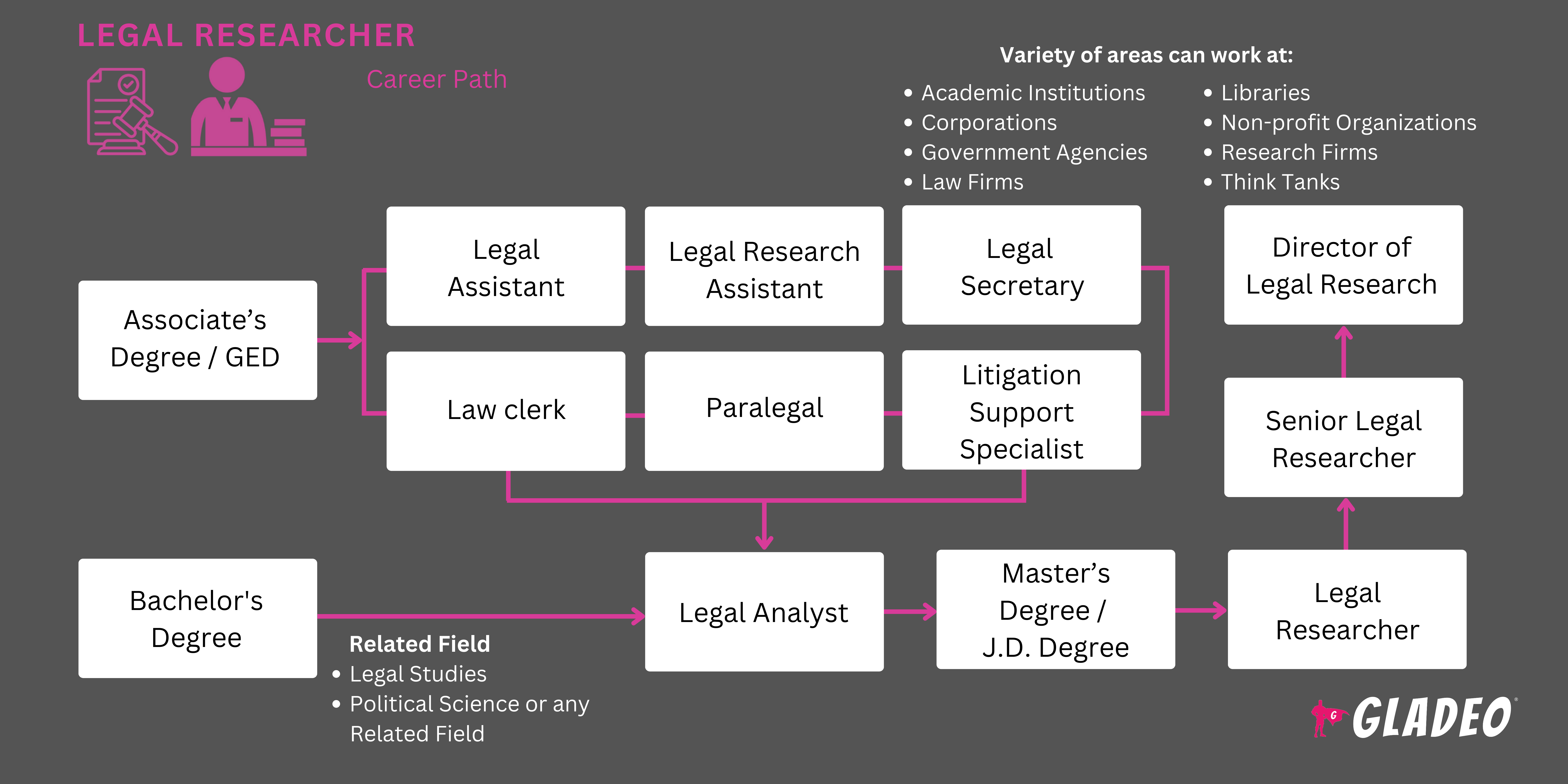Spotlights
Law Clerk, Legal Analyst, Legal Research Specialist, Legal Research Assistant, Legal Researcher/Writer, Legal Research Consultant, Legal Research Associate, Legal Information Specialist, Legal Research Librarian
Legal Content Specialist, Legal Investigator
Attorneys get paid a lot of money by their clients because they’re expected to win legal battles! But winning in court is no easy task. Many cases are incredibly complicated, requiring vast amounts of research and preparation. Often there’s too much work for a single attorney, which is when they turn to Legal Researchers for support.
Legal Researchers dive into case law and other materials to find information attorneys can use to devise strategies. They may work with Law Librarians and other professionals to comb through statutes, casebooks, court opinions, records, regulations, databases, and legal “fine print.”
These researchers, sometimes called law clerks, may work in law schools, private firms, corporate legal departments, government agencies, and other settings. Although they are behind the scenes, their efforts often make the difference between winning and losing a case.
- Helping others locate pertinent legal information
- Enabling access to accurate legal resources
- Supporting attorneys’ work to improve their odds of winning cases
- Working in a dynamic, intellectually stimulating environment
Lịch làm việc
- Legal Researchers typically work full-time office hours, with overtime possible. They may have to travel to obtain physical materials.
Nhiệm vụ tiêu biểu
- Conduct thorough legal research using statutes, codes, casebooks, court opinions, rules, records, regulations, journals, handbooks, databases, and dictionaries
- Analyze and summarize legal information to support attorneys in preparing for trials, hearings, and depositions
- Prepare legal research reports, memoranda, briefs, and other documents
- Work closely with attorneys, providing expert insights and recommendations
- Review legal catalogs and stay updated with new resources
- Borrow materials from libraries to supplement research resources
- Traveling to various sites to obtain legal documents or materials
- Maintain strict confidentiality of sensitive legal information and adhere to ethical standards
Trách nhiệm bổ sung
- Train and supervise assistants, staff, and volunteers, as needed
- Stay current with developments in legal research techniques and technologies
Kỹ năng mềm
- Khả năng thích ứng
- Phân tích
- Chú ý đến chi tiết
- Hợp tác
- Kỹ năng giao tiếp
- Phối hợp
- Tư duy phản biện
- Quyết định
- Sáng kiến
- Kỹ năng giao tiếp
- Kỹ năng tổ chức
- Nhận thức
- Giải quyết vấn đề
- Kỹ năng nghiên cứu
- Phán đoán đúng đắn
- Quản lý thời gian
Kỹ năng kỹ thuật
- Ability to analyze legal documents and regulatory information
- Familiarity with court docket systems
- Knowledge of research methodologies, legal software, and online resources (e.g., HeinOnline, JSTOR, PACER, Westlaw, LexisNexis, etc.)
- Legal citation and referencing styles
- Strong legal writing skills
- Using law library tools and databases
- Corporate legal departments
- Cơ quan chính phủ
- Công ty luật
- Law schools
- Public law libraries
Legal Researchers are vital members of the legal profession! They play a crucial role in assisting lawyers by providing valuable support in various aspects of legal research. Because their help is so important, they must stay current with legal developments and emerging technologies, which requires continuous learning.
They sometimes work under tight deadlines while juggling multiple tasks at once. Due to the nature of their work, they have to maintain strict confidentiality and ethical standards.
Legal Researchers increasingly use technology to enhance their efficiency and effectiveness.
For example, artificial intelligence (AI) can be used for predictive analytics, such as reviewing past case outcomes to predict future case results. AI-driven tools also help researchers understand complex legal texts and can automate the review of legal materials, reducing the time spent on these tasks.
Another growing trend is the development of digital libraries which can store vast amounts of resources, accessible 24/7.
Legal Researchers likely enjoyed reading and doing in-depth research into complex topics. They may have been highly organized growing up, with a keen interest in helping others. Many participated in debate clubs, library clubs, or similar activities.
- Some Legal Researchers start out as paralegals or legal assistants, which usually requires a minimum of an associate degree
- Paralegals often become certified through NALA or the American Alliance of Paralegals, Inc.. They can add to their credentials by completing legal research programs such as Lew & Clark Law School’s Prepare to Practice: Legal Research certification program or Thomson Reuters’ Westlaw research certifications
- Legal Researchers frequently pursue a bachelor’s or master’s related to legal studies. Many even finish a Juris Doctor degree. This isn’t necessarily required but it can make applicants more competitive and potentially qualify them for more advanced roles!
- Relevant college course topics include:
- Luật kinh doanh
- Truyền thông
- Quản lý cơ sở dữ liệu
- Dispute resolution
- Family law
- Information organization and management
- Intellectual property law
- Legal research methods
- Legal writing and citation
- Students should complete internships at law firms or law libraries to gain practical experience
- Legal Researchers can join the American Association of Law Libraries or other organizations to access continuing education resources, scholarships, and networking opportunities
- Legal Researchers often get started with an associate degree, though a bachelor’s is better. Many students finish undergraduate degrees in legal studies. These degrees are very suitable for online and hybrid study.
- Check out the faculty biographies to learn about their expertise in the field.
- Review the job placement rates for graduates.
- So sánh chi phí học phí và lệ phí, lưu ý chi phí trong tiểu bang và ngoài tiểu bang.
- Review scholarship and financial aid options, including federal aid Pell Grants.
- High school classes in English, writing, history, business, and computer science are useful
- Engage in activities that involve research and group collaboration
- Gain practical experience through part-time jobs, volunteer work, or internships
- Keep up with industry trends related to new technologies such as AI
- Watch YouTube videos about legal research
- Read articles and journals like the Journal of Legal Studies
- Try to set up an informational interview with a Legal Researcher to ask questions
- Keep track of your accomplishments on a draft resume

- Apply for law-related internships or apprenticeships to gain practical experience and make connections
- Consider starting as a paralegal or assistant while working on your bachelor’s
- Sign up for alerts on job portals like SimplyHired, Indeed, Monster, and Glassdoor
- Hỏi mọi người trong mạng lưới của bạn để biết mẹo về cơ hội việc làm
- Reach out to local law firms to inquire about upcoming openings
- Request former professors and supervisors to serve as your personal references. Be sure to get their permission before giving out their contact information
- Sử dụng trung tâm hướng nghiệp của trường bạn để được trợ giúp về sơ yếu lý lịch và phỏng vấn giả
- Check out Legal Researcher resume samples and sample interview questions
- Make sure your resume is error-free, concise, and up-to-date
- Learn how to make an amazing first impression!
- Review Indeed’s How to Dress for an Interview
- Talk with your supervisor about promotion or pay raise opportunities
- Pursue certifications or additional training relevant to legal research, such as advanced research methodologies or legal technology tools
- Consider earning a Juris Doctorate if it’ll help qualify you for advancement
- Train and mentor new Legal Researchers and assistants
- Provide outstanding service to the attorneys you assist to ensure positive experiences
- Stress accuracy and confidentiality at all times
- Take on leadership roles within professional organizations or committees to gain visibility and influence. Attend conferences to stay updated on trends
- Set goals for continual process improvement, such as incorporating new technologies
- Publish articles or papers in legal journals to establish yourself as an expert in the field
- Develop specialized expertise in a particular area of law
- Volunteer for high-visibility projects or committees within your organization
- Build a strong professional network by connecting with other legal researchers
- Seek feedback from colleagues and supervisors to identify areas for improvement
Trang web
- AALL Spectrum
- Hiệp hội Thư viện Luật Hoa Kỳ
- American Law Reports
- Hiệp hội Khoa học và Công nghệ Thông tin
- Hiệp hội sưu tập thư viện và dịch vụ kỹ thuật
- Hiệp hội thư viện đại học và nghiên cứu
- Case Western Reserve Journal of International Law
- Hiệp hội các Trung tâm Truyền thông Cao đẳng và Đại học
- Cornell Legal Information Institute
- Harvard Civil Rights – Civil Liberties Law Review
- Harvard Environmental Law Review
- Harvard International Law Journal
- Harvard Journal of Law & Technology
- Harvard Journal on Legislation
- Harvard Law & Policy Review
- Harvard Law Review
- International Association of Law Libraries
- Journal of Civil Law Studies
- Journal of Empirical Legal Studies
- Justia
- Law.com
- Law Library Journal
- Law Library Microform Consortium
- Legal Information Management
- Legal Information Preservation Alliance
- LLRX.com
- Medical Law Review
- Modern Law Review
- Hiệp hội quốc gia về các chuyên gia hỗ trợ pháp lý
- National Association of Legal Investigators
- Notre Dame Journal of Law, Ethics & Public Policy
- Oxford Journal of Legal Studies
- Hiệp hội thư viện đặc biệt
- Syracuse Journal of International Law and Commerce
- Syracuse Law Review
- The Journal of Legal Studies
Sách vở
- How To Learn And Memorize Legal Terminology Paperback, by Anthony Metivier
- Legal Research: How to Find & Understand the Law, by Editors of Nolo
- Reading Legal Writing 101: The Essential Guide to Clearly and Accessibly Understanding the Fundamentals of Law Language, by Stephen Wade
Legal Researchers are crucial to the legal profession, but the work may not appeal to everybody. For those who want to explore other career options, consider jobs such as:
- Academic Librarian
- Nhà lưu trữ
- Attorney
- Thư ký Tòa án, Thành phố và Giấy phép
- Court Reporter and Simultaneous Captioner
- Trợ lý điều hành
- High School Teacher
- Historian
- Information Scientist
- Điều phối viên giảng dạy
- Trợ lý pháp lý
- Chuyên gia hồ sơ y tế
- Museum Worker
- Người thẩm định tiêu đề
- Nhà văn
Nguồn cấp tin tức

Việc làm nổi bật

Các khóa học và công cụ trực tuyến








